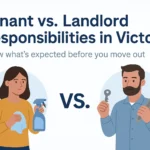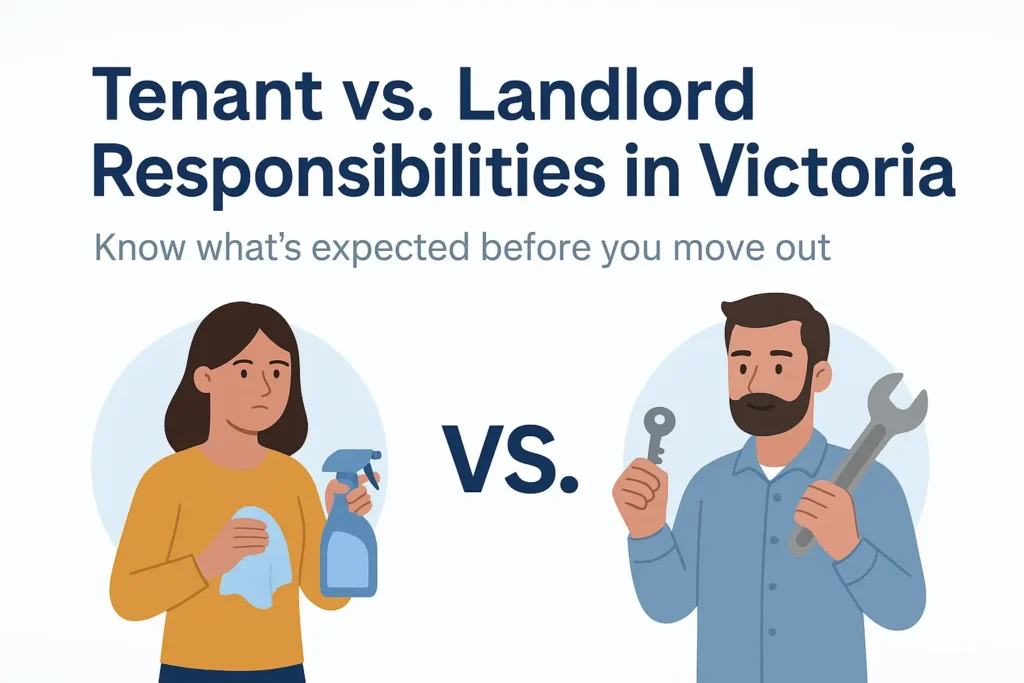Tenant vs. Landlord Responsibilities: Who’s Responsible for What in a Rental Property?
Whether you’re renting a property or managing one, understanding the division of responsibilities between tenant and landlord is crucial. Misunderstandings can lead to disputes, delayed bond refunds, or even legal action. This guide breaks down who handles what, based on Victorian rental laws, with a focus on end-of-lease obligations.
Tenant Responsibilities
Tenants are expected to maintain the property in a reasonably clean condition and to ensure no damage occurs beyond fair wear and tear. Key responsibilities include:
1. Cleanliness and General Upkeep
-
Keep the property clean during the tenancy.
-
Remove rubbish regularly.
-
Ensure bathrooms, kitchens, floors, and windows are hygienic and free of stains or buildup.
2. Damage Prevention
-
Avoid causing damage to the property or allowing others to do so.
-
Report any issues like leaks, mould, or broken appliances as soon as possible.
3. End-of-Lease Cleaning (Bond Cleaning)
-
Restore the property to its original condition (minus fair wear and tear).
-
Hire professional bond cleaners if required.
-
Steam clean carpets if specified in the lease agreement.
4. Utility Disconnections
-
Ensure gas, electricity, and internet are properly disconnected on the final day.
-
Pay all outstanding utility bills.
5. Gardening and Outdoor Areas
-
Mow lawns, trim hedges, and remove garden waste (if this is part of the lease agreement).
Landlord Responsibilities
Landlords (or property managers) are responsible for providing a safe, functional, and well-maintained property throughout the lease term.
1. Property Maintenance
-
Maintain the property in good repair.
-
Attend to plumbing, electrical, heating, and structural issues promptly.
-
Fix damage caused by wear and tear (e.g. leaking taps, aging fences).
2. Safety Requirements
-
Ensure smoke alarms are working and compliant.
-
Install locks on all external doors and windows.
-
Complete regular safety checks for gas and electricity (every 2 years under Victorian law).
3. Appliance and Fixture Maintenance
-
Maintain supplied appliances like dishwashers, heaters, or ovens.
-
Replace broken fittings unless tenant misuse is the cause.
4. Pest Control
-
Deal with pest infestations unless caused by tenant negligence.
5. Privacy and Notice
-
Provide proper notice before inspections or repairs (at least 24–48 hours depending on the reason).
-
Avoid entering the property without tenant consent unless there is an emergency.
Shared Responsibilities
Some responsibilities may be shared or depend on the terms of the lease agreement:
-
Water bills: Tenants usually pay for usage, while landlords pay for supply unless otherwise stated.
-
Gardening: This may be shared or clearly defined in the lease.
-
Damage disputes: Determining liability can depend on the situation (e.g. accidental damage vs structural issue).
What Happens During the Exit Inspection?
When a tenant leaves, the landlord will inspect the property. The tenant is expected to:
-
Hand back all keys.
-
Leave the property clean and damage-free.
-
Provide receipts for any professional cleaning or repairs, if required. Read: Do I really Need a Bond Clean?
The landlord must:
-
Compare the current state to the condition report from the start of the lease.
-
Return the bond within 14 days unless claiming part of it.
Final Tip
Clear communication and a solid condition report at the beginning of the lease are essential to avoiding disputes. If issues arise, tenants and landlords in Victoria can refer to Consumer Affairs Victoria for guidance or dispute resolution.
🧹 Moving Out Soon? Book a Professional Bond Clean!
Ace Bond Cleaners specialises in helping Melbourne tenants meet their end-of-lease obligations.
✔ 100% Bond Back Guarantee
✔ Real estate-approved checklists
✔ Affordable fixed pricing
📞 Call 0434 662 605 or Book Online today and leave your rental spotless.


